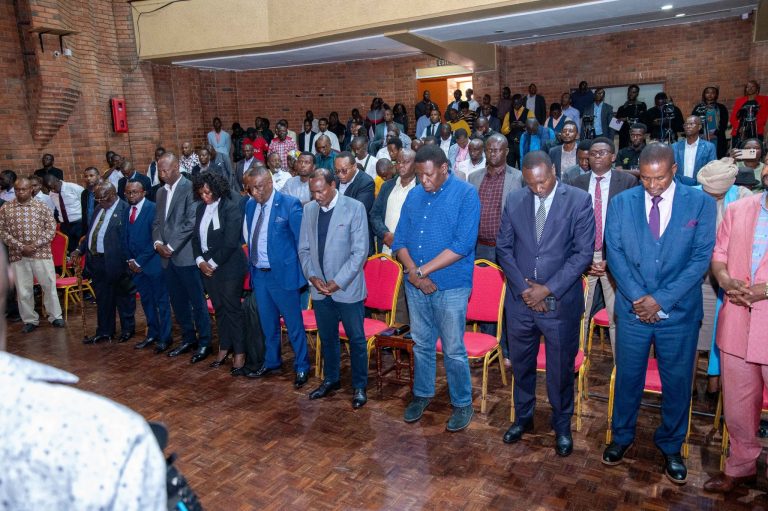A section of Kenya’s opposition leaders has launched a parallel justice tribunal in response to what they describe as a growing crisis of state violence and institutional collapse.
The People’s Restorative Justice Commission (PRJC) is a people-led tribunal created outside formal state channels, a response to what they attribute to mounting violence.
PRJC is billed as a grassroots mechanism to document abuses, push for accountability, and give voice to victims—outside the formal justice system.
The PRJC, which lacks any statutory backing, is chaired by former National Assembly Speaker Justin Muturi. Other members include Makueni Senator Dan Maanzo, People’s Liberation Party secretary general Asha Bashir, and public policy expert Prof Fred Ogola.
Its formation comes at a time of heightened political tensions, with opposition figures accusing President William Ruto’s administration of using excessive force against protesters and silencing dissent.
“Do we expect justice from the Ruto regime? A regime that would pick a young man, Albert Ojwang, from Homa Bay and bring him to Nairobi and murder him, then say he committed suicide?” DAP-K leader Eugene Wamalwa posed during the launch.
The opposition leaders, said predecessor commissions like the Akiwumi Commission to the TJRC – carried presidential seals but delivered little else, their reports were shelved, ignored, or weaponised.
The PRJC is not the first justice agency Kenya has seen. But it is the first to emerge with no statutory mandate and no state blessing.
It derives its mandate from Article 1 of the constitution of Kenya, which states that all sovereign power belongs to the people. That is its strength and its risk.
Organisers say the commission’s mandate includes collecting citizen testimonies, documenting cases of abuse, and supporting victims in pursuing private prosecutions.
The goal, they say, is to create a historical and moral record that can serve as a counterweight to what they view as compromised state institutions.
The launch was moderated by former Nairobi Town clerk Philip Kisia, as a reminder to June 25, a day now widely remembered as a watershed in Kenya’s protest movement following nationwide demonstrations marked by youth mobilisation and violent crackdowns.
“This approach reflects a deeper shift. Opposition forces are no longer litigating their place within Kenya’s institutional order. They are building alternative structures – of justice, of public memory, and of accountability – outside that order,” the commission noted.
However, critics argue that even symbolic pressure can have impact, especially if the commission is able to surface credible evidence and mobilise citizens around clear demands.
They say it lacks teeth and cannot compel witnesses, prosecute cases, or enforce rulings.
It will rely on private prosecutions and public advocacy tools that require high legal thresholds and sustained popular mobilisation.
The PRJC is expected to begin collecting statements in the coming weeks, as its founders try to turn protest energy into sustained political action—outside official channels.
For the opposition, the message is even sharper – justice will not be outsourced to a regime it considers irredeemably compromised.
The founders say the launch of this commission, is a tacit acknowledgement that the country is experiencing institutional collapse – that Parliament, courts and statutory commissions have either been captured or neutralised.
by JACKTONE LAWI


